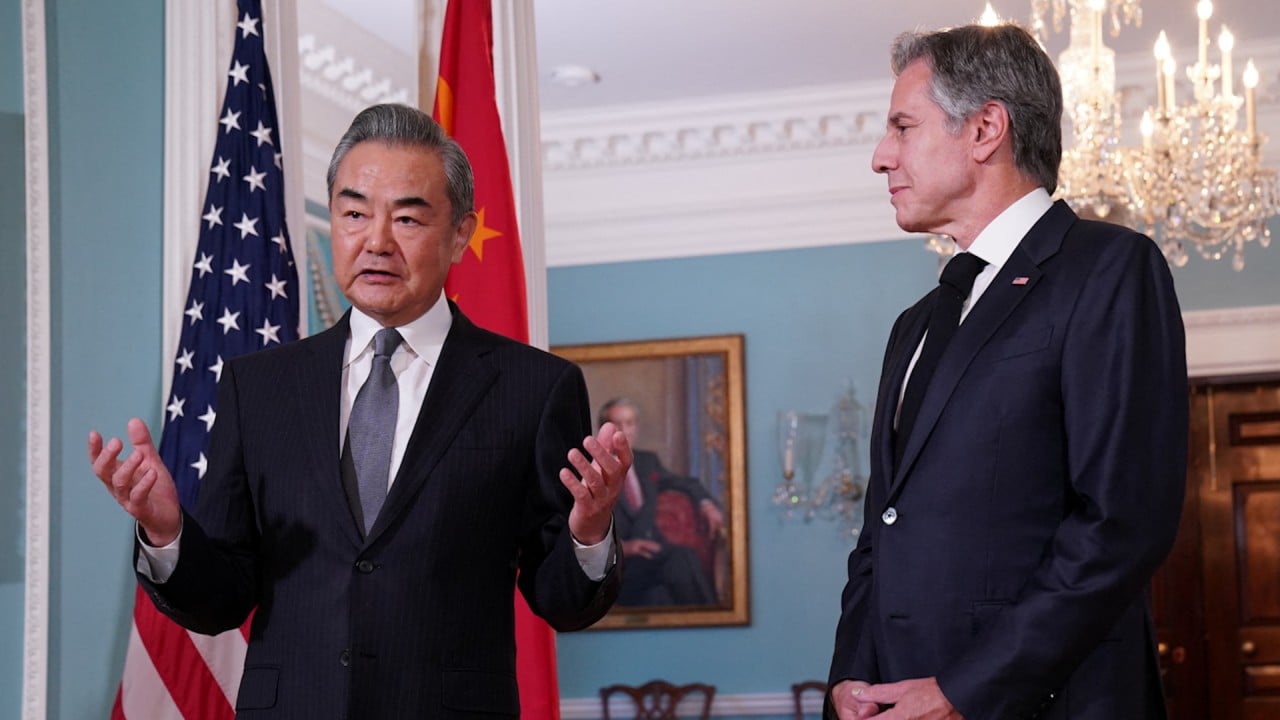
Xi Jinping, Joe Biden to speak ‘relatively soon’ amid Taiwan, Ukraine and Middle East tensions
- After meeting with Chinese Foreign Minister Wang Yi, US National Security Adviser Jake Sullivan confirms two leaders will speak by phone ‘sooner rather than later’
- There ‘is no substitute for leader-to-leader conversation’, Sullivan says
“We agreed that President Biden and President Xi should speak and should speak by telephone relatively soon. And I think the acknowledgement … is that there really is no substitute for leader-to-leader conversation.” Sullivan said, according to a statement from the White House.
“And so, both of us agreed that we would report back to our leaders and we would get them on the phone sooner rather than later.”
Beijing has not confirmed that a call will take place, but a readout from Xinhua said that after their nine-hour talks in Bangkok, Wang and Sullivan agreed that the two leaders “will maintain regular contact”.
Beijing and Washington have maintained frequent exchanges since Xi and Biden met in California in November, where Xi called for the two countries to “have more communications, more dialogues, and more consultations”.
Meanwhile, Liu Jianchao, the veteran Chinese diplomat leading the International Liaison Department, the Communist Party’s diplomatic arm, visited the US last month during the Taiwanese election.
Liu, widely tipped to be China’s next foreign minister, met US Secretary of State Antony Blinken, as well as academics, business leaders, media representatives, and former officials during the six-day trip to Washington, New York, and San Francisco.
US lawmakers criticise lifting of sanctions to gain China’s help on fentanyl
The US has labelled China as a “primary source” of ingredients used in manufacturing fentanyl and fentanyl-related substances. Beijing has long denied any involvement in the opioid crisis.
China’s public security minister, Wang Xiaohong, has held video meetings with US Secretary of Homeland Security Alejandro Mayorkas last month to step up efforts to tackle the opioid trade as well as wildlife trafficking and child sexual abuse and exploitation, according to the US.
US Treasury Secretary Janet Yellen also plans to visit China later this year to strengthen communications.
US Commerce Secretary Gina Raimondo and John Kerry, the outgoing White House climate envoy, were also among top US officials who visited Beijing last summer.
Xi also met with US Senate Majority Leader Chuck Schumer and California governor Gavin Newsom before his trip to San Francisco.
Any phone call between Xi and Biden will be mainly focused towards their respective domestic audiences, according to Alfred Wu, an associate professor at the Lee Kuan Yew School of Public Policy at National University of Singapore.
“For the US side, it is because of Biden’s election purposes,” Wu said, adding that Biden wants to be seen as the candidate that can “handle [US-China] issues compared with Donald Trump”.
The US presidential election is set for November with Biden sitting at an approval rate of only 33 per cent, the lowest in his presidency, according to a poll conducted by ABC News and Ipsos.
Taiwan ‘red line’ on table as Chinese liaison chief meets Biden security aide
“From Xi Jinping’s side … it’s a boost for him to be more popular domestically,” Wu added.
Neither Beijing nor Washington have revealed which topic would top the agenda during the coming call.
But since Xi and Biden met in California, turbulence has continued in the Middle East and in Ukraine, while tensions remain high across the Taiwan Strait and the Korean peninsula.
He added that China has “an obligation” to influence Tehran over the Houthi militants, a reference to the ongoing Red Sea attacks.
Sullivan said he stressed to Wang that the US continues to hold to the one-China policy, the Taiwan Relations Act, the six assurances, and other pillars of US-China understanding concerning the self-governed island.
“I was also clear that we continue to have concerns about elevated levels of aggressive military activity around the [Taiwan] Strait. We do not regard that as conducive to peace and stability.
“And we generally want to see, as I think the rest of the world does, peace and stability across the Taiwan Strait. And we are committed to doing everything we can to support that,” Sullivan said.
Taiwan’s KMT strengthens hand in legislature after securing speaker’s chair
Wang told Sullivan in Bangkok that Taiwan independence was “the greatest risk to peace and stability in the Taiwan Strait” and “the greatest challenge to China-US relations”, adding that the US “must abide by the one-China policy … and support reunification of China”, according to state news agency Xinhua.
Wu said Xi and Biden may also discuss Lai’s inauguration, set for May 20.
Beijing sees Taiwan as part of its territory, to be reunited by force if necessary. Like most countries, the US does not recognise Taiwan as an independent state.
But Washington maintains robust unofficial ties with Taipei, opposes any attempt to take the island by force, and is committed to supplying it with weapons – positions that frustrate Beijing.


